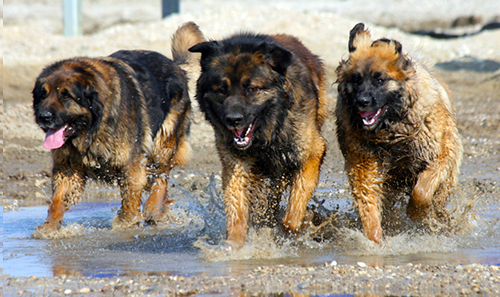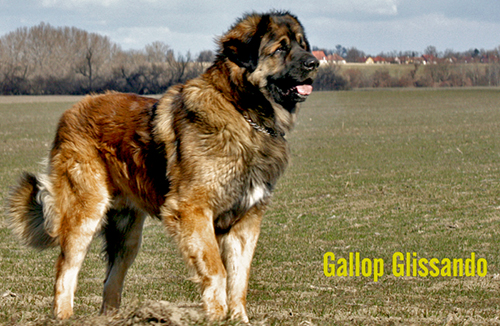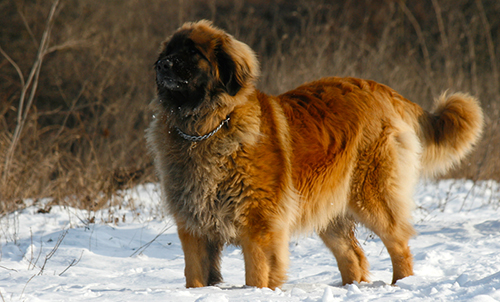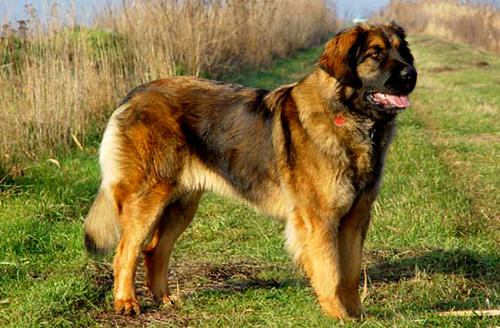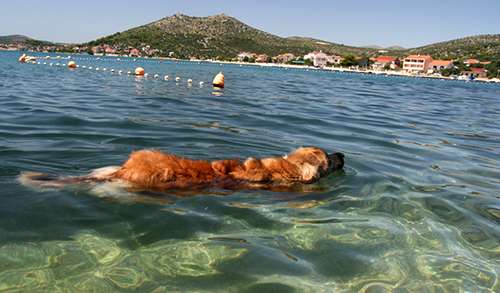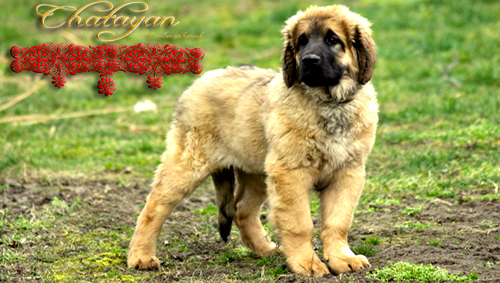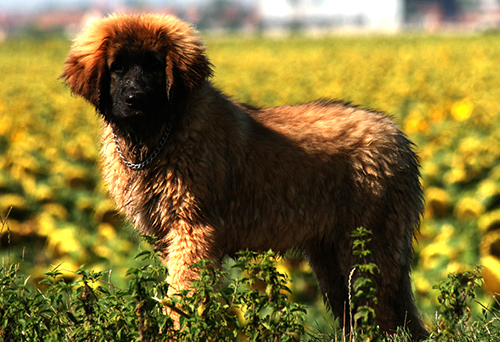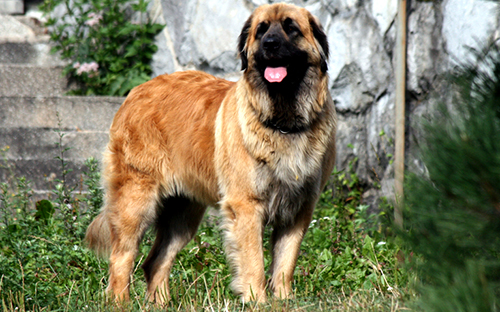
Leonberger and You
Welcome on Leonberger Chatayan Website where you are able to find lots of important information about Slovak Leonberger events and news.
What's New:
First Heading or Title
 Quality of Slovak leonbergers is really high. They are convenient as pets.
Quality of Slovak leonbergers is really high. They are convenient as pets.
Updated: March 10, 2015
Current News:
First Heading or Title
 Slovak Leonberger club is member of International Leonberger Union
Slovak Leonberger club is member of International Leonberger Union
Updated: March 10, 2015
Recent Events:
First Heading or Title

Slovak leonberger club exhibition will be on 16th of May 2015
Updated: March 10, 2015
Designed for
Leonberger and You.
Most Leonbergers are wonderful, loving dogs...but due to their size and strength, they are NOT the dog for everyone. They require time, dedication, grooming and above all...training to ensure a well-behaved dog. Buying any dog should be a lifetime commitment, so make sure that you learn about the Leonberger before you buy.
Please consider the following guidelines:
Don't buy a Leonberger if you don't want to share your home (not just your yard) with your dog. They are devoted to their people and want to be with you as much as possible. They are likely to behave badly to alleviate their boredom - digging, chewing, barking, etc. They will tolerate being left home by themselves for short periods, as long as they spend time with you when you are home.
Don't buy a Leonberger if you have only seen them at shows - with glistening coats, dry and ?uffy. The Leonberger's true nature is to romp and swim outdoors. They thrive on being wet and don't mind mud at all. Their natural look is slightly damp with leaves stuck to their coats.
Don't buy a Leonberger if you don't want to spend the time to train your dog . Although they are called "Gentle Giants", they do go through a very stubborn adolescent stage. It's imperative to teach them to respect and honor you and your rules at this point - if you don't, you will have a 100+ pound canine that does not know how to behave to make you happy (they may take food from the table because they can, sleep on the couch or your bed when full of mud, or take off chasing a cat down the street with you attached to the other end of the leash).
They want to please you, but they need guidance from you to know how. This requires committing to at least a puppy kindergarten course, as well as basic obedience classes before the dog is one year old. It is essential to do 1-2 short (10 minute) homework sessions every day during their ?rst two years of life, as well as incorporating the lessons into your daily life as often as possible. This training cannot be delegated to someone else (e.g., boarding school) because the relationship of respect and obedience is personal between the dog and the person doing the training. As each lesson is learned, the rest of the household must also work with the dog, ensuring that they are obeyed as well.
Don't buy a Leonberger if you are a fastidious housekeeper . They have long fur that tends to be everywhere. They shed mainly twice a year (in large quantities), but there is always some fur in the corners. They adore being wet and muddy - that means wiping four paws every time they come in from outside unless you don't mind the occasional muddy paw print. Their coats usually look and smell clean which means that the mud and muck that they love to play in has come off on your ?oors, and oftentimes walls and furniture, as well. Their tails are at the perfect height to sweep the coffee table knickknacks right off. Although they don't drool, they are not the most ef?cient about closing their mouths after drinking water, or eating. They may dribble food or water across your freshly mopped ?oors.
Don't buy a Leonberger if you are unwilling to attend to their basic health and grooming needs. They need to be examined by a veterinarian every 3 weeks until they are 4 months old, and then at least once a year. They need a good brushing and nail trimming once a week. If you don't want to use this time to bond with your dog or are unable to do this yourself, be prepared to spend the extra money to have your local groomer or veterinarian do it. They need daily checks for ticks and foxtails when these health risks are in season. Unless you provide them with large raw bones to keep their teeth clean, or brush their teeth daily, they will need periodic dental care from a veterinarian.
Don't buy a Leonberger if you cannot afford to buy, feed, and provide healthcare for one. The care that goes into keeping the Leonberger breed sound and healthy cannot be done cheaply; therefore, they are relatively expensive dogs when purchased from an LCA-approved breeder. They are large dogs, which means that the monthly food bills are considerable. (This also means that the yard pick-up chore is sometimes considerable). Spaying and neutering, as well as any other type of surgery, are more expensive for large dogs because the anesthesia charge is proportional to body weight. Actually, almost everything seems to be a little more expensive (crates, dog beds, food bowls, etc. for large dogs than smaller ones).
Don't buy a Leonberger if you don't like daily exercise. They need to have at least 2 half hour daily walks, or one of about an hour, every day. They thrive on play sessions with other dogs, but are perfectly happy to play with you. Most Leonbergers love to swim and including water in their daily exercise keeps them very happy. Exercising your dog well will prevent a lot of problems that can occur when dogs are bored and have no outlet for their energy. Even a well-trained dog will misbehave when they don't receive enough exercise (excessive barking, charging fences, jumping up on people, digging, chewing inappropriately, etc.)
Don't buy a Leonberger if you are not willing to answer the "What kind of dog is that?" question at least 20 times/week (sometimes 20 times/walk).
Don't buy a Leonberger if you don't believe in providing them with a home for their entire lifetime. Be sure to contact your breeder with any questions or problems in raising your Leonberger to be the companion dog that he/she was meant to be. Make sure to make arrangements for your dog if you should pre-decease him/her or become terminally ill.
Before you decide to buy a leonberger puppy, you should think of your answers to the following questions:
1. Will I buy a pedigree leonberger?
2. Do I live in a family house with a big garden?
3. Is my property fence of a high enough standard?
4. Will I be able to teach the dog to obey basic commands?
5. Does my family agree with keeping a leonberger?
6. Do I want a female or a male dog?
7. Do I have enough spare time to spend with a leonberger?
8. Will I be able to cover the cost of food, vaccinations, and veterinary care?
9. Will I take part in dogs' exhibitions to provide further breeding?
If your answers have been positive, please continue reading. You will take a fancy to your dog as soon as you bring them home from a breeding station. If you have children, the puppy will become their companion. The puppy needs peace and quiet for the first two weeks after it has been brought to a new environment. Do not let your children bother the dog; they usually lose interest in a couple of days, which solves the problem automatically.
The puppy creates a social environment in the first days in the new home, they get used to it and create a hierarchy. They define the master who they will obey most, which is usually the head of the household. They consider the family to be their pack and their behaviour is determined by that. Their main objective is to eat four times a day and sleep properly. When the puppy is alert, try to teach them to recognize their name and come to you when you call them. Train them for several minutes a day. A puppy loses interest far too quickly. Keep in mind that the dog must always regard the training as play. The results will manifest themselves shortly afterwards.
You need to provide your puppy with a suitable bed, kennel, bowl for food and water, etc. If the puppy is used to staying inside a house, let them do so; it is very easy to unteach them the habit (if it is not desirable for you any longer). The first two or three days are depressing for the doggie: they miss their mother, and siblings, they feel lonely and might cry for hours. Spend enough time with them, and be company for them. You do not need to overdo caring for them; the puppy at eight weeks of age is too small and prefers to relax and sleep.
A good breeder will give you food which they used for breeding puppies. You can switch to any you choose by gradual adding the new food into the that from the breeder. Granular food Eukanuba, Royal Canin, Happy dog, etc have proven with leonbergers. When you choose the food, take into account if the producer makes also various food supplements – the good ones do – and if they produce special food for giant breeds. Some companies, e.g. Royal Canin even have in granular food for puppies various products according to the age of a puppy. Make your own decisions, but listen to advice from others; not from a seller though, they usually praise the food they sell. Buy food for large or giant breeds.
Do not experiment on a little puppy as for the choice of food, their digestive tract does not tolerate excessive burden, which might induce a dangerous diarrhoea. A leonberger is grown up at the age of 24 months and until then you should buy food for puppies.
After your leonberger has reached two years of age, you can switch to food for adult dogs. I don't hold the opinion that the dog should only be fed granulated food; they like boiled food, too (meat, rice, fish, vegetables). A leonberger can eat a whole boiled 2-3 kg rabbit, let alone a chicken.
A little puppy becomes a big dog in the space of a few weeks, and their teeth start to grow. It then tends to tear and bite everything around, including rags, shoes, decorative woods and front doors. It is the time between three and 12 months of age - when the puppy has already been given the veterinary vaccinations and worm treatment - that they experience walks outside and meet strange people and dogs. Ask a veterinary doctor about vaccination against lyme disease (boreliosis) – a tick-borne disease; a leonberger is likely to catch it outdoors. The protection is not guaranteed effective, but at least you should try it.
Get your little puppy used to water and swimming. Do not miss the opportunity to swim with them in a lake; the puppy should swim alongside you and not try to save you. If you neglect this, the dog will scratch you with its strong claws once they are adult. Leonbergers love swimming, and they are very persistent. They also make good water- rescuers; they have swimming membranes/pellicles, and enormous power.
How to teach your puppy not to bite everything? I did well with a child's toy – a water gun with a range of five metres. Wait for the right moment, and once the puppy starts to bite, act. You only need to splash the dog with cold water several times. The same technique works with excessive barking. Teach your dog to be afraid of cars. Splash your puppy only when they act in an undesirable manner. The splashing should be accompanied with a command such as „yuk“, or „you can't do that“. Later punishments and yelling do not help. Be vigilant while giving praise and punishment. Praise the dog as often as possible, but don't neglect the admonishments either. Don't punish your dog in a way which might cause you to be afraid of them in the future, and never hit the dog with your hand.
Think about integrating your dog into the surroundings. You don't want your leonberger to be aggressive; you don't need a guard dog that only bites and tears everything he can find. Take them for walks from three months of age, and let unfamiliar people and little children stroke them. Meet other dogs, but beware of the aggressive ones. Socialization of the dog is very important, and adult dogs cannot in any case show signs of aggression – and you can only teach them so at a very young age. An aggressive leonberger will never be used for breeding, and you will lose opportunity to breed puppies.
At the time when a leonberger is easiest to train (3-12 months of age), its weight is about 20-45 kg. You can handle them easily, because they are not too heavy yet. Buy a book explaining how to train dogs, or find a dog trainer. I have had no problems while training my leonbergers, as they understand quickly and like to learn. They have often surprised me with their abilities. Every dog has a different temperament, and you need to take that into account. Teach them commands like: sit down, lie down, stay, you cannot ... Teach them to walk by your left leg, and turn while walking. This is essential, as your dog will weigh more than 60 kg when fully grown. There is nothing worse than a big and unmanagable dog.
You can teach your dog to be non-aggressive by bringing guests to your home as often as possible. Let them experience strangers entering and leaving in your company. A leonberger will get it very fast that they are not endangered with strangers in your company. You will not have problems with visits when the dog is adult. You will then be able to let your sturdy home guard to run free with a complete stranger. You will not only be proud of yourself and the training, but also pleased by the flattery of your guests on your beautiful dog.
Do not forget the postman. Give both of them a possibility to meet and trust each other. The postman will be a regular host at your gate and your leonberger will never bark at him and will let him place your post in the letter box. Teach your dog to ignore cyclists and skaters. Skates create unpleasant noise for the dog, and they might start to bark or be aggressive. Teach him not to be afraid of loud noises, thunderstorms, crackers, shooting.
I have learned myself that a dog should not have the annoying habit of jumping at people and barking at everything. A leonberger, just like any other dog, protects its territory, and you can't avoid noisy barking when strange dogs pass your house. I have not yet found the way to unteach my dog this habit, and have to face frequent barking at small wandering dogs in our village.
Hopefully I have given you an idea of breeding a leonberger. In this form it can only be considered to be a short manual. It will be your own experience that will show you the pros and cons of breeding a leonberger. If there is a space for training dogs in your vicinity, register and attend the training on the exercise ground. Your dog will get accustomed to different breeds, will learn courage and will learn to bite and attack in the way you want it. Under attacking I understand training on the exercise ground. Experienced trainers will help you to keep a dog you will be proud of; one that will walk in a circle with other dogs, next to one another, that will recognize all basic commands and in older age will learn to be fearless and attack a figurant. It might all seem unnecessary, but the attack on the figurant is serves a purpose: the dog will only jump at figurant’s arm so they will not jump at anybody’s neck in the future. It is also very important to teach the dog courage, as normally this breed is likely to suffer from timidity.
Only buy a leonberger from an approved breeder!
A breeding dog from a breeding station is under supervision of exhibition judges and a leonberger only becomes suitable for breeding if they meet all the requirements placed on the breed. A dog must take part in several exhibitions, and be evaluated at least 24 months old. The whelping itself is monitored by the breed consultant and a veterinary doctor.
At purchase, beware of the quality of the litter, number of puppies, rating of the breeding station and services which the breeder provides you with, i.e. information, willingness to agree upon the price, fixing the purchase contract. You will recognize these at a personal meeting. Do not buy a puppy without seeing the breeding station unless you are not bringing the puppy from a long distance. Do not buy a puppy without a contract. Inform the breeder if you don't wish to exhibit your dog. You will probably get a puppy of a lesser quality, but considerably cheaper. Not all puppies from the litter will be of world quality and the breeder recognizes this. Nobody can guarantee, however, that you will buy a puppy to win a world exhibition, or the exhibition in Leoberg in Germany. Still, the breeder can choose the most promising puppy for you.
If the puppy is sold abroad, it is provided with an international passport, pedigree and a chip.
Quality of Slovak leonbergers. Slovak Leonberger Club.
A Slovak leonberger is a noble animal, qualitatively comparable with Czech, Hungarian, Polish, German, Danish, Swedish, English and other leonbergers.
There are incredibly few puppies and quality litter. About 20 puppies are born annually, and only a small percentage (about two or three puppies) appear on the next year’s dog show. Those young leonbergers are not necessarily the best of breed, which brings poor results to Slovak exhibitors. The situation of Slovak leonbergers is the result of poor promotion of the breed, the state of the Slovak economy and weak administration of the Slovak Leonberger Club.
On the other hand, a new phenomenon has arisen here: ‘Every man for himself’, as if nobody wanted to join forces and match a good animal with another successful breeder, and try to breed a Slovak leonberger of world quality. However, that's not to say that there aren't not good leonbergers in Slovakia. More and more often puppies appear with impressive names in their pedigree. The quality of Slovak leonbergers is improving markedly. Still, we exhibit them little in Slovakia, and none of us go to neighbouring countries such as the Czech Republic, Poland, Hungary, and Austria.
A change has come about in the Slovak Leonberger Club.Jan Kovač has become the new Chairman. You can find the Slovak Leonberger Club on the internet: www.leonberger.sk
The new management has been in office for three years now. However, on many internet sites there is false information about the Chairman. Even the official site of the Slovak Kynologic Association has the Chairman's name wrong, even two years after the change!
It is possible to rely on the willingness of the members, but few of the little number are ready to help. Still there is one advantage, compared to the Czech Republic – we don't argue, and we want to create good atmosphere for breeding leonbergers in Slovakia. If you want to join us, you can also do so via chatayan.net. I am not a member of the club management, but would be glad to help you to register.
My website exclusively dedicated to leonbergers is the first in Slovakia, which I am proud of, but sadly since 2004, when it was first created, nobody has tried to follow me. I hope this situation changes, and that more websites appear in the future.
The new management of the Slovak Leonberger Club is working hard, but the results are poor. I have been trying for some time now to find out where the problem is and to find a way to promote and breed these beautiful dogs in Slovakia. It is not a leonberger who needs us, but we who need a leonberger. Why are there dogs bred in gardens around villas and never shown in exhibitions? How come no magazine about dogs issued in Slovakia is able to write a line about leonbergers? Why is it only the most devoted ones who come to the Club exhibition?
The quality of the breed depends on the prospective import of foreign dogs or mating abroad. The breed is spread all over the world, and you will discover how small the world is once you check your foreign leonberger’s pedigree. It would have never struck me that leonbergers live, for instance, in the the Philippines. You will make internet friends all over the globe once you become an owner of a leonberger. I keep in touch with people in Australia, Canada, the U.K, Poland, Italy and Germany – and we talk about leonbergers!
Why is the price of puppies so high?
A breeding station with leonbergers needs to take into account the following factors: mating needs to be paid for, a domestic one is cheaper than foreign. Breeding of a female breed dog is costly, due to food, vaccinations and exhibitions. A breed female may only whelp once a year. Mating might not always be successful, and there might be few puppies in a litter. Puppies must be vaccinated and worm-treated at sale.
Also an important factor is that the buyer is willing to pay the price, which means they really want the leonberger and will create a good environment for them. Those who do not have money to buy the puppy, will not have money to breed it. A breeder has a right to refuse to sell a puppy once they expect possible problems with its future care. In case you are interested in buying a leonberger puppy, it is highly recommended that you meet the breeder in person, and visit the breeding station before and after the whelping. The purchase price is only a fraction of what the dog will cost you in the course of their life. Leonbergers’ life expectancy is 10-13 years. The dog will never yell at you, be angry with you, and will show you love and affection in moments of sadness and happiness.
The price of a puppy in Slovakia ranges from 700 to 1300 eur.
You can always negotiate this price and a mutual agreement between buyer and seller might be beneficial. The minimal price is not necessarily the most profitable one. You can possibly buy a cheap puppy with no prospects of successful breeding. It is usually too late by then, and you will regret the little money you have saved. You can, as well, buy an expensive puppy which may become ill and lose any chance of taking part in exhibitions. It is a lottery. However, the exhibitions are not the most important thing. There is also the love of animals, and your leonberger can be the greatest in the world just in your garden. Still I assume that the Slovak price is similar to prices abroad. Good Slovak breed is of the same quality, and over the course of time the sale of puppies from Slovakia will become easier. If you decide to buy, this is my advice: look at how much money you spend on things you only needed on the day you bought them, and they ended up gathering dust soon after. A leonberger will remind you every day they are here only for you.
I am continuously surprised by advertisements like "I will sell a leonberger, without papers, from parents successful at exhibitions, good with children, a good guard dog". Many people who want a leonberger call me, but they don't want a dog with papers, nor do they want to participate in exhibitions. They ask me if I know breeders without papers. I never provide information about a person, who will deliberately, just for their own profit, sell a leonberger without papers, and I have reasons for that, the main one being that I don't intend to lower the quality of the Slovak breed and support those people who would dilute the breed. These dogs do not necessarily have the typical features, dispositions, or build of a leonberger, and once you are not satisfied with your growing dog, they will never be happy with you. Your money will be wasted, and you will hardly buy them branded granular food if its price is half the price of the purchace price. And the result? Some day you will be standing in the street by a robust dog, and when asked: "What breed is this?" you will answer ashamedly: "A leonberger!"
Will it be a real leonberger?
My breeding station, Chatayan, will refund every buyer a certain sum of the price of the puppy - which will be stated in the purchase contract - after taking part in exhibitions. I would like for other breeding stations to adopt a similar approach; we might achieve 50 leonberger registrations in the club exhibition, not only the 20-25 together with the Czechs and Hungarians.
Do I want a male or a female dog?
You need to take into consideration two important factors. Firstly, you need to consider if you want a breeding male dog, orif you want to breed puppies. Is preparation, expecting, whelping, and rearing puppies what you want to experience? And do you have enough time and determination for all of this? If you do not, choose a male dog. They are more dominant, robust, and good-looking.
Let’s leave aside the myths that a female dog is problematic in the time of her estrus cycle. It is not true. You only need a bit of patience. A female dog can take care of herself. What you need to do is to avoid undesirable conception. If you enclose the dog in an appropriately fenced aviary, this will not be a problem. If your female dog couples with a different dog, you will always pay for a breeding dog.
A female dog squat when she urinates, a male dog will raise his rear leg up to approximately 60 cm. A male dog will deprive you of all decorative woods in your yard and garden. The decorative woods must be fenced by proper wire. This doesn't need to be a problem, it is just a question of the size of your garden.
Do not forget that this is also an important factor.
If a male smells a female during her cycle, he is able to get over a two-metre fence. Try to prevent him from learning climbing while he is still a puppy, and he won’t manage it when he grows up and weighs 60 kg. I have already seen an 80 cm tall leonberger behind a one-metre fence which he never climbed. However, my Beny was able to climb a 2.2 m high fence in about 10 seconds, which made me enclose his aviary from the upper side.
A male dog is alert at night, and sometimes tries to attract attention by barking noisily. He loves to express his own dominance over other dogs as far as 500-700m away. If you want a dog that will be admired by children and passers-by, buy a male.
A female dog is alert during the day, and carefully guards her territory. Her possible afternoon barking is unpleasant. Consider possible problems with your neighbours as for breeding your dog. Families often raise a dog as a watchdog. Your neighbours should realize that the dog actually watches their property, even if they are bred in a neighbouring house. Barking can be taught and untaught. If a puppy barks, give commands „bark“ and once the barking is undesirable, give command „quiet“. Wait by the fence, and when a somebody passes by and your dog starts to bark, give them a clear command „quiet“. A puppy will understand it in time and you will reduce the unwanted barking.
Both sexes can be equally well trained to obey, and can be trained using special books in about 5-6 months. Get your dog used to children. A puppy is unlikely to understand that little children belong to our society. If the puppy is older than a year and has already become a robust dog, they do not necessarily need to understand that a child belongs to us, adults. That is why the child and the dog need to get to know each other very soon. A child smells and behaves differently, is of different height and might hurt the leonberger which might possibly defend themselves. The dog might consider the child a catch, unless trained at a young age not to. A dog can feel human fear very easily, and children are likely to express it noisily, which might not be appropriate. The dog must be socialized! In fact, I have seen hundreds of leonbergers, and I have never been scared of one in the presence of their owners. Children are not generally afraid of them, either. Should you doubt it, just go and see a dog exhibition and notice how leonbergers behave.
Even though children jump at the dog, they will consider it a game. A leonberger understands the hierarchy in the house and even the weakest link will not be threatened by them. However, there are cases in which the dog only obeys their masters.
Do not buy a puppy of a leonberger for a child – they will not take good care of him. The dog will grow incredibly fast, and in a year you will have a little child and a huge dog. What is more, the child cannot train the dog properly.
In case you already have a leonberger, and a child is born, be careful. I have no experience with this case, but I would recommend that you prevent the child from bothering the dog when you are not present. A leonberger might possibly protect its food, or express their dominant position. It is all about establishing a hierarchy, and the dog will always consider the child to be the least component of the pack. The dog will protect itself by barking, growling or snarling loudly. The dog might not know its own strength, and might hurt the child. And later on, your child and dog will definitely make very good friends.
Why take part in dog’s shows? Why be a member of the Slovak Leonberger Club?
The primary condition of having a breeding dog are exhibitions. You can register your dog in one according to their age, and once you have paid you can exhibit your dog in a circle. By a circle we mean the space in which you meet with other leonbergers of the same sex and age. It is usually an international judge who will assess your dog. The results will be written into the pedigree if your dog wins the competition, or comes second, i.e. reserve. It is also you who creates the overall impression from the performance of your dog. You will lead your dog on your left side, the dog is not allowed to jump at you, sit down or show aggression towards other dogs in the circle. Train them to run in a circle, walk, and stand in exhibition position, in which the strength of their limbs, chest and build are shown. The dog should keep their head upright so that they look as robust as possible. The dog’s teeth must also be shown to the judge, and also its testicles in the case of a male dog. Train this carefully before an exhibition.
At an exhibition, you will recognize very quickly if there is any prospect of you breeding a champion, or just a dog of average quality. Even though the assessments of the judges might vary, you will get an overall evaluation of your leonberger, and you will learn all you need to know about them. If your dog wins one exhibition after the other, it will be enjoyable for you and them as well. You will establish contacts with other breeders, which might be of benefit to you. Only by comparing your dog with other leonbergers will you get an objective view of the temperament, build, weight, and hair of your dog. You can also arrange further breeding with another breeder at an exhibition.
The dog’s language.
Every dog expresses feelings by their behaviour; they can express annoyance, anger, joy, friendliness, etc. Over the course of time you will also understand your dog’s language. It will wag its tail when happy, straighten its ears and stand in a ‘show position’ when alert, raise its tail and straighten its rear legs to signal attack position, while lying on its back and lifting legs will indicate submission, and fear will be expressed by drawing its tail between its legs. If your dog is ready to play, it will lie on its front legs, while its rear legs are outstretched and the dog is waiting patiently for your command to play. There is much more to be said, for instance about the look in their eyes and other means of expression. Barking is also an important means of expressing joy, anger, establishing a contact, attracting attention, etc. Anyway, ideally it will be you who understands your dog’s language...
And this is what matters while breeding a dog.
I wish every new and experienced breeder luck in choosing a puppy and many beautiful moments in your life together.
Miro Lantaj 15th August, 2006
